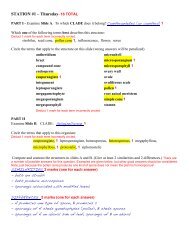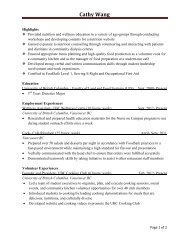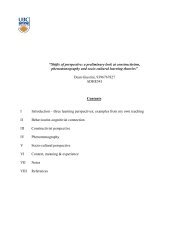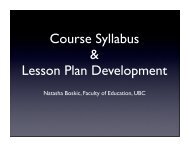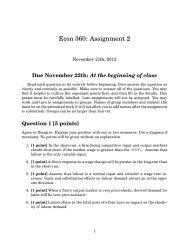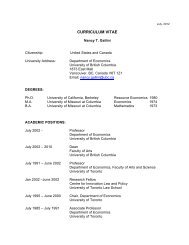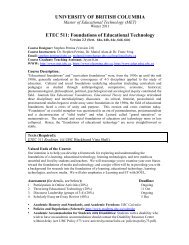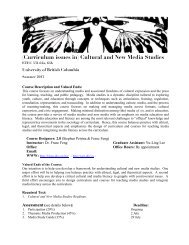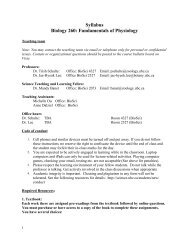introduction au 17e : les règles du jeu boileau et ... - UBC Blogs
introduction au 17e : les règles du jeu boileau et ... - UBC Blogs
introduction au 17e : les règles du jeu boileau et ... - UBC Blogs
You also want an ePaper? Increase the reach of your titles
YUMPU automatically turns print PDFs into web optimized ePapers that Google loves.
INTRODUCTION AU 17 E : LES RÈGLES DU JEUBOILEAU ET ARISTOTE EN ABRÉGÉI. Boile<strong>au</strong>, L’Art poétique (1674)Dans Satires, Épîtres, Art poétique, éd. Jean-Pierre Collin<strong>et</strong> (Paris : Gallimard, 1985) :227-58.NB relations avec Racine ; « |’affaire des sonn<strong>et</strong>s » / l’affaire de Phèdre (1677) ; <strong>et</strong> tous<strong>les</strong> deux nommés historiographes <strong>du</strong> Roi quelques mois après. Épîtres VII, À M. Racine :Que tu sais bien, Racine, à l’aide d’un acteur,Émouvoir, étonner, ravir un spectateur ! (1-2)Structure de l’Art poétique : 4 « chants »Chant IBesoin de génie – bon sensQuelque suj<strong>et</strong> qu’on traite, ou plaisant, ou sublime,Que toujours le bon sens s’accorde avec la rime (27-28)Aimez donc la raison : que toujours vos écritsEmpruntent d’elle seule <strong>et</strong> leur lustre <strong>et</strong> leur prix. (37-38)Prenez mieux votre ton, Soyez simple avec art,Sublime sans orgeuil, agréable sans fard. (100-01)Il est de certains esprits dont <strong>les</strong> sombres penséesSont d’un nuage épais toujours embarrassées ;Le jour de la raison de le s<strong>au</strong>rait percer.Avant donc que d’écrire apprenez à penser.Selon que notre idée est plus ou moins obscure,L’expression la suit, ou moins n<strong>et</strong>te, ou plus pure.Ce que l’on conçoit bien s’énone clairement.Et <strong>les</strong> mots pour le dire arrivent aisément. (147-54)+ attention <strong>au</strong>x flatteurs :Et, pour finir enfin par un trait de satire,Un sot trouve toujours un plus sot qui l’admire. (231-32)<strong>17e</strong> : Boile<strong>au</strong> : 1
Chant IIDébut à la Virgile ; histoire brève <strong>et</strong> satirique de la poésie française …Telle qu’une bergère, <strong>au</strong> plus be<strong>au</strong> jour de fête,De superbes rubis ne charge point sa tête,Et, sans mêler à l’or l’´clat des diamants,Cueille en un champ voisin ses plus be<strong>au</strong>x ornements ;Telle, aimable en son air, mais humble dans son style,Doit éclater sans pompe une élégante idylle.Son tour simple <strong>et</strong> naïf n’a rien de fastueux,Et n’aime point l’orgueil d’un vers présomptueux.Il f<strong>au</strong>t que sa douceur flatte, chatouille, éveille,Et jamais de grands mots n’épouvante l’oreille.Mais souvent dans ce style un rimeur <strong>au</strong>x aboisJ<strong>et</strong>te là, de dépit, la flûte <strong>et</strong> le h<strong>au</strong>tbois ;Et, follement pompeux, dans sa verve indiscrète,Au milieu d’une églogue entonne la tromp<strong>et</strong>te.De peur de l’écouter, Pan fuit dans <strong>les</strong> rose<strong>au</strong>x,Et <strong>les</strong> nymphes, d’effroi, se cachent sous <strong>les</strong> e<strong>au</strong>x.Au contraire c<strong>et</strong> <strong>au</strong>tre, abject en son langage,Fait parler <strong>les</strong> bergers comme on parle <strong>au</strong> village.Ses vers plats <strong>et</strong> grossiers, dépouillés d’agrément,Toujours baisent la terre, <strong>et</strong> rampent tristement :On dirait que Ronsard, sur « ses pipe<strong>au</strong>x rustiques »,Vient encor fredonner ses idyl<strong>les</strong> gothiques,Et changer, sans respect de l’oreille <strong>et</strong> <strong>du</strong> son,Lycidas en Pierrot, <strong>et</strong> Philis en Toinon.Entre ces deux excès le route est difficile.Suivez, pour la trouver, Théocrite <strong>et</strong> Virgile :Que leurs tendres écrits, par la Grâce dictés,Ne quittent point vos mains, jour <strong>et</strong> nuit feuill<strong>et</strong>és.Seuls, dans leurs doctes vers, ils pourront vous apprendrePar quel art sans bassesse un <strong>au</strong>teur peut descendre ; (1-30)… <strong>et</strong>c. sur l’églogue …L’élégie : « d’un ton plus h<strong>au</strong>t, mais pourtant sans <strong>au</strong>dace / la plaintive élégie, en longshabits de deuil… » (38-39)Mais, pour bien exprimer ces caprices heureux,C’est peu d’être poète, il f<strong>au</strong>t être amoureux.Je hais ces vains <strong>au</strong>teurs, dont la muse forcéeM’entr<strong>et</strong>ient de ses feux, toujours froide <strong>et</strong> glacée ;Qui s’affligent par art, <strong>et</strong>, fous de sens rassis,S’érigent, pour rimer, en amoureux transis. (43-48)<strong>17e</strong> : Boile<strong>au</strong> : 2
Voulez-vous sur la scène étaler <strong>les</strong> ouvragesOù tout Paris en foule apporte ses suffrages,Et qui, toujours plus be<strong>au</strong>x, plus ils sont regardés,Soient <strong>au</strong> bout de vingt ans encor redemandés ? (1-14)En vain vous étalez une scène savante :Vos froids raisonnements ne feront qu’attiédirUn spectateur toujours paresseux d’appl<strong>au</strong>dir,Et qui, des vains efforts de votre rhétorique,Justement fatigué, s’endort ou vous critique.Le secr<strong>et</strong> est d’abord de plaire <strong>et</strong> de toucher :Inventez des ressorts qui puissent m’attacher. (20-26)L’action + le suj<strong>et</strong> n’est jamais assez tôt expliqué (37)Le lieu de la scène : le fixerMais nous, que la raison à ses règ<strong>les</strong> engage,Nous voulons qu’avec art l’action se ménage :Qu’en un lieu, qu’en un jour, un seul fait accompliTienne jusqu’à la fin le théâtre rempli. (43-46)Jamais <strong>au</strong> spectateur n’offrez rien d’incroyable :Le vrai peut quelquefois n’être pas vraisemblable.Une merveille absurde est pour moi sans appas :L’esprit n’est point ému de ce qu’il ne croit pas. (47-50)L’histoire brève de la tragédie … le roman [on y reviendra plus tard dans ce cours, avecLa Princesse de Clèves] … le théâtre : champ périlleux … la poésie épique : pire encore… la fable (cf La Fontaine)R<strong>et</strong>our <strong>au</strong>x généralités :Voulez-vous longtemps plaire, <strong>et</strong> jamais ne lasser ?Faites choix d’un héros propre à m’intéresser,En valeur éclatant, en vertus magnifique :Qu’en lui, jusqu’<strong>au</strong>x déf<strong>au</strong>ts, tout se montre héroïque ;Que ses faits surprenants soient dignes d’être ouïs ; (245-49)On s’ennuie <strong>au</strong>x exploits d’un conquérant vulgaire.N’offrez point un suj<strong>et</strong> d’incidents trop chargé. (252-53)Souvent trop d’abondance app<strong>au</strong>vrit la matière.Soyez vif <strong>et</strong> pressé dans vos narrations ;Soyez riche <strong>et</strong> pompeux dans vos descriptions.C’est là qu’il f<strong>au</strong>t des vers étaler l’élégance.<strong>17e</strong> : Boile<strong>au</strong> : 4
N’y présentez jamais de basse circonstance. (256-60)[on reverra ceci avec Molière <strong>et</strong> la comédie…]Sur de trop vains obj<strong>et</strong>s c’est arrêter la vue.Donnez à votre ouvrage une juste éten<strong>du</strong>e.Que le début soit simple <strong>et</strong> n’ait rien d’affecté. (267-69)… d’un ton aisé, doux, simple, harmonieux (277)De figures sans nombre égayez votre ouvrage ;Que tout y fasse <strong>au</strong>x yeux une riante image :On ne peut être à la fois <strong>et</strong> pompeux <strong>et</strong> plaisant ;Et je hais un sublime ennuyeux <strong>et</strong> pesant.J’aime mieux Arioste <strong>et</strong> ses fab<strong>les</strong> comiques,Que ces <strong>au</strong>teurs toujours froids <strong>et</strong> mélancoliques,Que dans leur sombre humeur se croiraient faire affrontSi <strong>les</strong> Grâces jamais leur déridaient le front. (287-96)Homère… puis un r<strong>et</strong>our <strong>au</strong> généralités uti<strong>les</strong> :Aimez donc vos écrits, mais d’un amour sincère ;C’est avoir profité que de savoir s’y plaire.Un poème excellent, où tout marche <strong>et</strong> se suit,N’est pas de ces trav<strong>au</strong>x qu’un caprice pro<strong>du</strong>it :Il veut <strong>du</strong> temps, des soins ; <strong>et</strong> ce pénible ouvrageJamais d’un écolier ne fut l’apprentissage.Mais souvent parmi nous un poète sans art,Qu’un be<strong>au</strong> feu quelquefois éch<strong>au</strong>ffa par hasard,Enflant d’un vain orgueil son esprit chimérique,Fièrement prend en main la tromp<strong>et</strong>te héroïque :Sa muse déréglée, en ses vers vagabonds,Ne s’élève jamais que par s<strong>au</strong>ts <strong>et</strong> par bonds :Et son feu, dépourvu de sens <strong>et</strong> de lecture,S’éteint à chaque pas f<strong>au</strong>te de nourriture.Mais en vain le public, prompt à le mépriser,De son mérite f<strong>au</strong>x le veut désabuser ; (307-22)L’importance de la postérité … le désir de voir un r<strong>et</strong>our <strong>du</strong> bon sens … Histoire de lacomédie antique [on y reviendra plus tard dans ce cours avec Molière…]J’aime sur le théâtre un agréable <strong>au</strong>teurQui, sans se diffamer <strong>au</strong>x yeux <strong>du</strong> spectateur,Plaît par la raison seule, <strong>et</strong> jamais ne la choque.Mais pour un f<strong>au</strong>x plaisant, à grossière équivoque,Qui, pour me divertir, n’a que la sal<strong>et</strong>é,<strong>17e</strong> : Boile<strong>au</strong> : 5
Qu’il s’en aille, s’il veut, sur deux tréte<strong>au</strong>x monté,Amusant le pont Neuf des ses sorn<strong>et</strong>tes fades,Aux laquais assemblés jouer ses mascarades. (421-28)Chant IV[Histoire de l’assassin florentin.]Son exemple est pour nous un précepte excellent.Soyez plutôt maçon, si c’est votre talent,Ouvrier estimé dans un art nécessaire,Qu’écrivain <strong>du</strong> commun <strong>et</strong> poète vulgaire.Il est dans tout <strong>au</strong>tre art des degrés différents.On peut avec honneur remplir des seconds rangs ;Mais dans l’art dangereux de rimer <strong>et</strong> d’écrire,Il n’est point de degrés <strong>du</strong> médiocre <strong>au</strong> pire. (25-32)Prendre garde : attention, de nouve<strong>au</strong>, <strong>au</strong>x flatteurs + quelques caricatures + choisissez un« censeur solide <strong>et</strong> salutaire, que la raison con<strong>du</strong>ise <strong>et</strong> le savoir éclaire » (71-72). [Onreprendra c<strong>et</strong>te partie sur <strong>les</strong> lecteurs avec la Princesse de Clèves]Aimez la vertu – fuyez <strong>les</strong> basses jalousies (105-11)Un sublime écrivain n’en peut être infecté ;C’est un vice qui suit la médiocrité. (113-14)Un équilibre entre la poésie professionnelle <strong>et</strong> la fuite d’ « un vil amour <strong>du</strong> gain » (169)Et que craindre en ce siècle, où toujours <strong>les</strong> be<strong>au</strong>x-artsD’un astre favorable éprouvent <strong>les</strong> regards,Où d’un prince éclairé la sage prévoyanceFait partout <strong>au</strong> mérite ignorer l’indigence ?Muse, dictez sa gloire à tous vos nourrissons.Son nom v<strong>au</strong>t mieux pour eux que toutes vos leçons. (189-94)Que Racine, enfantant des mirac<strong>les</strong> nouve<strong>au</strong>x,De ses héros sur lui forme tous <strong>les</strong> table<strong>au</strong>x ; (197-98)Mais tandis que je parle un gloire nouvelleVers ce vainqueur rapide <strong>au</strong>x Alpes vous appelle. (211-12)Auteurs, pour <strong>les</strong> chanter, redoublez vos transports :Le suj<strong>et</strong> ne veut pas de vulgaires efforts.Pour moi, qui, jusqu’ici nourri dans la satire,N’ose encore manier la tromp<strong>et</strong>te <strong>et</strong> la lyre,Vous me verrez pourtant, dans ce champ glorieux,<strong>17e</strong> : Boile<strong>au</strong> : 6
Vous animer <strong>du</strong> moins de la voix <strong>et</strong> des yeux ;Vous offrir ces leçons que ma muse <strong>au</strong> Parnasse,Rapporta <strong>jeu</strong>ne encor de commerce d’Horace :Seconder votre ardeur, éch<strong>au</strong>ffer vos esprits,Et vous montrer de loin la couronne <strong>et</strong> le prix.Mais <strong>au</strong>ssi pardonnez, si, plein de ce be<strong>au</strong> zèle,De tous vos pas fameux, observateur fidèle,Quelquefois <strong>du</strong> bon or je sépare le f<strong>au</strong>x,Et des <strong>au</strong>teurs grossiers j’attaque <strong>les</strong> déf<strong>au</strong>ts ;Censeur un peu fâcheux, mais souvent nécessairePlus enclin à blâmer que savant à bien faire. (221-36)FINII. Aristotle (FR Aristote), On the Art of Po<strong>et</strong>ry (4th c. BCE)Main points from each chapter are summarised below; chapters with nothing furtheradded are either only relevant to Classical literature (ex. on Greek pronunciation…), orthe title is self-explanatory and self-evident to The Modern Reader (ex. we know whatthe unities are: Boile<strong>au</strong>, chant III, ll. 43-46; and we know what fear and pity are), or notrelevant for our present purposes (ex. comedy and epic).Intro<strong>du</strong>ction: Po<strong>et</strong>ry as imitationCh 1: Media of po<strong>et</strong>ic imitation.Representation. New concept of po<strong>et</strong>ry (language but no music).Ch. 2: Objects of po<strong>et</strong>ic imitation.Men: b<strong>et</strong>ter, worse, or same as us.Comedy vs. tragedy: comedy represents men as worse than they are nowadays, tragedy asb<strong>et</strong>terCh 3: Manner of po<strong>et</strong>ic imitationNarration and characters (much of this is only relevant to Greek)Ch 4: Origins and development of po<strong>et</strong>ryInstinct for imitation + instinct to enjoy works of imitation. Feeling for music andrhythm. Hypoth<strong>et</strong>ical genesis and history …Ch 5: Comedy, and epic compared with tragedy.Ch 6: Description of tragedy“Enriched” language (see Boile<strong>au</strong>, “pompeux”, dignified and noble)6 parts: plot, character, diction, thought, spectacle, and song (inc. stage-effects).<strong>17e</strong> : Boile<strong>au</strong> : 7
Ch 7: Scope of the plotThere should be a beginning, middle, and end. It should be well-constructed, and be madeup of parts, properly ordered and of appropriate size; be<strong>au</strong>ty is related to size and order,and reasonableness.These remarks are found throughout Aristotle, applied to a number of things – fromplants, to indivi<strong>du</strong>al people and how to be well-balanced, to soci<strong>et</strong>ies, and the universe asa whole. What’s crucial is appropriateness, harmony, balance, reason.If you look up RATIO, RATIONALE, REASON, and associated words (reasonable,reasoning, <strong>et</strong>c.) in a good dictionary that includes historical usage (ex. the OED online),the connections will be clear.Ch 8: Unity of plotCh 9: Po<strong>et</strong>ic vs historical truthThe two are not the same; truth is not necessarily identical with fact. For som<strong>et</strong>hing to be“po<strong>et</strong>ically truthful” it should possible and credible. In the case of tragedies based onmythological and/or historical events, there is some leeway for invention along the way;but events should not – broadly speaking – be presented as contrary to the facts (ex. wecan’t rewrite the Phèdre/Hippolyte scene and change the play’s direction towards a happyending). Possibility and credibility parallel vraisemblance.Ch 10: Simple and complex plots - Ch 11: Reversal, discovery, and calamity - Ch 12:Main parts of tragedy - Ch 13: Tragic action - Ch 14: Fear and pity (see Boile<strong>au</strong> onémouvoir)Ch 15: The characters of tragedyCharacters should be good – the portrayal appropriate – characters should be lifelike –and consistent.IMPORTANT: distinction b<strong>et</strong>ween character and <strong>au</strong>thor, and their opinions; those of acharacter should not be ascribed to this fiction’s <strong>au</strong>thor; characters should act incharacter, i.e. in a way that is appropriate to them (so axe-murderers should behaveaccordingly).The unravelling of the plot should arise from the plot itself, and not be brought about exmachina.Ch 16: Different kinds of discoveryThe key turning-point in a drama… Permissible ways for this to happen (and NB no deusex machina allowed): by signs and tokens (ex. a ring) – som<strong>et</strong>hing manufactured by thepo<strong>et</strong> (ex. a l<strong>et</strong>ter) – a memory recalled / recognition (ex. Odysseus’ dog) – reasoning(working it out) – fallacious reasoning (…)Ch 17-18: Ru<strong>les</strong> for the tragic po<strong>et</strong>.Ch 19-22: Thought and diction; what words work; po<strong>et</strong>ic diction; styleAppropriateness, balance, and harmony. Much of this section has more bearing on 4 th c.BC Greek than on 17 th c. (and later) AD French. Reminder: Aristotle is writing on<strong>17e</strong> : Boile<strong>au</strong> : 8
absolutely ev<strong>et</strong>ything – the sum total of human knowledge and has a conception of hisworks as an interconnected whole thing (from how a plant is put tog<strong>et</strong>her, to themovements of the plan<strong>et</strong>s; via human <strong>et</strong>hics, politics, sociology, psychology, dreams,myth, history, why animals don’t l<strong>au</strong>gh but humans do; through to logic and maths; andso on…). What’s worth noting is an overlap – and there are many overlaps andintersections in Aristotle b<strong>et</strong>ween the Po<strong>et</strong>ics, the Rh<strong>et</strong>oric, and those parts of the Politicsand Ethics to do with public speaking and persuasion.Bearing in mind Boile<strong>au</strong>’s warnings against wily flatterers; and we’ll r<strong>et</strong>urn to this withLa Princesse de Clèves, the ro<strong>les</strong> of the narrator and the reader, and se<strong>du</strong>ction proper.Ch 23-24: Epic po<strong>et</strong>ryCh 25: Critical objections and their answersThis joins up with the points made in 15 on character: on different standards of truth inpo<strong>et</strong>ry, as disctinct from fact, history, politics, <strong>et</strong>c.Ch 26: Epic and tragedy comparedTragedy wins, as it achieves its ends b<strong>et</strong>ter – mainly bec<strong>au</strong>se it has more tools, tricks, anddevices at its disposal. Compare, in the 21 st c., an epic poem and a film (or, b<strong>et</strong>ter still, amore leisurely TV serialization).NB This is a rough outline only: the full texts are available online (Perseus Project) andin book form. The main most recent English translations are the Jonathan Barnes/Oxfordone (indivi<strong>du</strong>al works + 2-volume compl<strong>et</strong>e works), or those published by Hack<strong>et</strong>t.There’s also a splendid (and readily-available and cheap) Penguin containing the po<strong>et</strong>icstreatises of Aristotle, Horace (1st c. BCE), and Longinus (a.k.a. pseudo-Longinus, oftennow supposed to be “anon”; approx. b<strong>et</strong>ween 3rd c. CE and 1 st c. BCE); called ClassicalLiterary Criticism (c. 150 p). Fundamental to French and other European po<strong>et</strong>ics andliterary criticism of the 17 th c., and later, and indeed of the 20 th and 21 st c.COMMON GROUND:AppropriatenessDifference b<strong>et</strong>ween the more usual sense of truth (= fact) and a relative, more elastic“po<strong>et</strong>ic truth” (that parallels vraisemblance)Reason, balance, and harmonyAristotle also happens to act as common ground in 17 th c. French e<strong>du</strong>cation: bridging theJesuit/Jansenist divide. A “classicism” of shared culture générale, much of which isClassical (antique).FOR THE TUTORIAL- We will be working on the Préface (and DISCUSSION BOARD topics)- And we will be commenting on vraisemblance and bienséance in The Key Se<strong>du</strong>ctionScene (II.5, Phèdre/Hippolyte).<strong>17e</strong> : Boile<strong>au</strong> : 9




